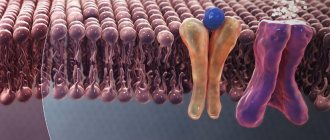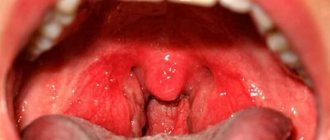The type of inheritance of cystic fibrosis is autosomal recessive. If the mother and father are carriers of the gene for this disease, but are not sick themselves, then the chances of having a child with cystic fibrosis are 25%. Cystic fibrosis manifests itself in the first two years of a baby’s life. Moreover, the earlier the symptoms of cystic fibrosis appear, the more severe the course of the disease and the worse the prognosis. The overall life expectancy of people with cystic fibrosis usually does not exceed 40 years.
Scheme of X-linked recessive inheritance of diseases
Causes of cystic fibrosis
The main causes of cystic fibrosis are mutations in genes encoding a protein that takes part in the water-electrolyte metabolism of epithelial cells. As a result, the secretion they secrete becomes thick and is removed outside with great difficulty. Due to its constant accumulation, the glands undergo deformation and irreversible processes begin to occur in them. As a result, everything ends with the death of the glands and their replacement with connective tissue. Such changes lead to the organ ceasing to function.
Mucus begins to stagnate in the bronchi. This makes it difficult for the ciliated epithelium to work. Dust, small smoke particles, viruses and bacteria settle on the surface of the mucous membrane. In conditions of high humidity and temperature, microorganisms multiply well, causing an inflammatory process. Prolonged, low-grade inflammation leads to a decrease in local immunity, deformation of the ciliated epithelium of the bronchi, and even greater disruption of its function. The bronchi become less elastic, their lumen constantly narrows, creating an even more favorable environment for the proliferation of bacteria.
Constant accumulation of mucus makes breathing difficult. The body does not receive enough oxygen. As a result, the functioning of all organs and systems is disrupted.
Since the pancreas produces too thick a secretion, its ducts become clogged. This further complicates the outflow of secretions and causes inflammation. In conditions of the inflammatory process, the supply of oxygen and nutrients deteriorates. Sclerotic processes are activated in the organ. The gland becomes deformed and its function is further impaired. Since an insufficient amount of enzymes is released into the child’s duodenum, the stool becomes very viscous, constipation and bloating develop. Due to malabsorption of nutrients, the child lags behind in physical development.
“All such people should be in intensive care”
I then lived in a village not far from Bogoroditsk (Tula region). One day the sputum started to come out with bloody streaks.
I called an ambulance and heard: “We won’t go to you, your road there is bad.” Then, right in the kitchen, I started having a panic attack - I was suffocating from the thought that no one would help me.
Then, when it went away, I called the doctor in Moscow, he told me what medications to take. It wasn't so scary anymore.
And my mother went out into the street and screamed, sometimes she went into the forest to scream properly.
I went out into the street “on the device.” Dad made me a small veranda on the porch of the house, and putting an oxygen cannula through the window, I “walked.” When it was easier, the device was taken out into the yard, then I painted the garage with various cartoons for my nephew.
It was 2010, forest fires. It was incredibly hot, there was thick smog over the city, and there was not enough air for everyone. We opened the window and curtained it with a wet rag, but it didn’t really help. And since Soviet times, our village has been connected by communications from a garment factory. The factory was in debt for electricity, and their lights were turned off. And along with them, the entire village, and I was left without a concentrator. I called Elektroset and almost shouted:
- What are you doing? I'm going to die now!
“It’s impossible,” they answered me, “for such a person to be at home.” All such people should be in intensive care.
True, later the electricians even came to us and asked passers-by if it was true that “a man with an apparatus” lived here. Empirically, we calculated the shutdown schedule - at least three times a week for two hours - and bought a gasoline generator, fortunately, our house is private.
When it became really hard for me to breathe, he even gave me a larger device, a ten-liter one.
But the generator’s power was no longer enough for it - it kept switching off. We spent two years like this. And then the transplant program appeared. Not everyone has the strength to fight Maya Sonina, Charitable Foundation “Oxygen”: – The main burden of routing treatment here falls on the parents, and more often than not these are single mothers. In some cases, patients with cystic fibrosis refuse to fight for medicines and do not stand in line for a transplant. And this means that the person will die very soon. But patients get used to the idea that they won’t have to live very long, because they simply don’t have enough strength to live with the disease and fight the disease.
Signs and symptoms of cystic fibrosis
Clinical symptoms of cystic fibrosis depend on the form of the disease:
- pulmonary form. As the name suggests, this form of cystic fibrosis affects the respiratory system. The patient develops chronic bronchitis with difficult to separate sputum, and frequent pneumonia is observed. The cough is constant, exhausting, and causes insomnia. As a result, pulmonary and then heart failure develops first;
- intestinal form. It manifests itself as symptoms of gastrointestinal damage, which leads to anemia, hypovitaminosis and weight deficiency. If the liver is affected, jaundice may develop;
- mixed form. Combines the symptoms of intestinal and pulmonary forms of the disease;
- atypical forms. Meconium ileus in newborns. Viscous intestinal contents clog the newborn's intestines, which makes it impossible to pass stool.
The layering of infection is accompanied by a pronounced intoxication syndrome. The patient's temperature rises, complaints of general weakness, sweating, and severe malaise arise. The cough intensifies and often becomes debilitating. The patient loses his appetite, and his performance is greatly reduced. Bronchitis and pneumonia are difficult to treat and tend to be protracted.
In infants, the symptoms of cystic fibrosis are:
- thick and greasy feces, with a pungent, foul odor;
- rectal prolapse; enlarged liver;
- delayed physical development;
- bloating;
- deformation of the chest and phalanges of the fingers;
- dry skin;
- lingering dry cough.
Often, when kissing, a mother notices the salty taste of the baby’s skin. With additional examination, the doctor confirms the diagnosis of cystic fibrosis.
Signs and symptoms of cystic fibrosis
They said: “You can’t ride the subway, and you can’t kiss—not even on the cheek.”
On the fifth day after the operation, pneumonia began, this is “normal”, it happens in 70% of patients - immunity is lowered. I was discharged only after two months, and already at home I slowly learned to walk and run quickly again...
It was scary to go home: the doctors said that you couldn’t take the subway, you couldn’t have close contact with people, and you couldn’t even kiss them on the cheek. Nowadays, after a transplant, they don’t play it safe, but then I was the first cystic fibrosis patient, and to be on the safe side, I was prescribed all the European recommendations for “severe” patients.
For the first six months, my relatives and I wore a mask. Then I got tired of it, and I started wearing a mask only when going outside, and then only when going to stores or to the cinema. Now I only put on a mask if someone is coughing nearby.
Every two months I go for tests, in which doctors look at how much of the immunosuppressant that suppresses rejection remains in the blood.
Starting from November 2021, they promised to replace my medications with domestic ones. Let's hope nothing bad happens, some people drink and it suits them. True, there was the case of Marina Blinnikova, about whom Oxygen wrote, her lungs began to be rejected due to generics.
As soon as the rejection was confirmed, we (the patients) gave her the excess original drugs.
She bought them herself and contacted Oxygen. Now the state is issuing original immunosuppressants, but it is not possible to completely stop rejection. That is, just three months of taking generics and life changed dramatically.
Or maybe my doctor will become more mature and buy the original drug.
You may not be able to survive on generics Maya Sonina, CF “Oxygen”: – The profile medicine for cystic fibrosis is imported “Creon”, it is not just the enzyme pancreatin, it is also granulated in a special way to “work” in a strictly defined part of the intestine. Widely advertised digestive enzyme preparations for ordinary people are absolutely not suitable for patients with cystic fibrosis. Now Russian patients are most often prescribed domestic and conditionally domestic (Indian and other countries) generics that have not undergone clinical trials. In order to receive original Creon or imported antibiotics, the patient must record side effects and submit an application for individual purchase. The decision whether the patient will receive the original drug is made by the regional Department of Health.
Disease severity
In determining the severity of cystic fibrosis, signs of damage to the respiratory system play a major role.
Depending on their severity, the following degrees of severity of the pathology are distinguished:
- I - cystic fibrosis is characterized by minor changes of a non-permanent nature, cough and shortness of breath appear only during physical exertion;
- II - manifested by a chronic inflammatory process in the bronchi, constant moderate shortness of breath and deformation of the phalanges of the fingers. On auscultation, moist rales are heard;
- III - manifested by progressive damage to the bronchi and lungs, with the development of foci of fibrosis and sclerosis, the appearance of bronchiectasis, and the appearance of signs of cardiac and respiratory failure;
- IV - accompanied by severe heart and lung failure.
Assessing the symptoms, the doctor adjusts the dosage of drugs, thereby ensuring complete treatment of cystic fibrosis.
Recovery forecasts
Scientists and pharmacists are constantly working to create new drugs that can normalize the concentration of chlorides in the body and improve lung function. The main goal is to restore CFTR function using corrective medications. At the moment, the hereditary disease cannot be completely cured, but with sufficient medical support it can be controlled. The later the signs of the disease appear, the better the prognosis for the patient. It is difficult to give an accurate prognosis for life expectancy with such a diagnosis. Much depends on the severity of the genotype and the type of its mutation, the rate of occurrence of complications. Treatment of cystic fibrosis in children remains a pressing issue. There are about 3,500 people in Russia with this diagnosis. The average lifespan for uncomplicated stages is 30 years.
Diagnosis of cystic fibrosis
Timely diagnosis of cystic fibrosis is of great importance for a child’s life.
Before a diagnosis of cystic fibrosis is made, the following measures are taken:
- study of hereditary history, early symptoms and clinical manifestations of the disease; urine and blood analysis (general);
- coprogram is a study of feces for the content of starch, muscle fibers, fiber, fat, with the help of which the degree of disruption of enzymatic processes in the glands of the digestive tract is determined;
- sputum examination (microbiological);
- X-ray examination of the lungs - to identify sclerotic and infiltrative changes in their tissues; bronchography – detect bronchial defects;
- bronchoscopy - determine the presence of viscous and thick thread-like sputum in the bronchi;
- spirometry - determine the functional state of the lungs by measuring the speed and volume of exhaled air;
- molecular genetic testing - DNA or blood samples are analyzed to identify mutations in the cystic fibrosis gene;
- a sweat test is the main test for cystic fibrosis, with the help of which the patient is diagnosed with an increased content of sodium and chlorine ions in the sweat;
- prenatal diagnosis of cystic fibrosis - newborn children are examined for congenital and genetic diseases.
The intestinal form of cystic fibrosis must be distinguished from intestinal absorption disorders observed with disaccharidase deficiency, dysbacteriosis and enteropathy. The pulmonary form is differentiated from bronchial asthma, pneumonia of other origins, whooping cough and obstructive bronchitis.
How to make an appointment with a doctor
Cystic fibrosis in children is accompanied by medical supervision. If you suspect hereditary factors, the presence of characteristic symptoms and the manifestation of signs, you should seek medical help. JSC "Medicine" (clinic of academician Roitberg) provides consulting services to specialists, conducts comprehensive health diagnostics and can offer qualified support for children with severe hereditary diagnoses. The clinic is located in the Central Administrative District and close to the Mayakovskaya metro station, as well as Novoslobodskaya, Chekhovskaya, Belorusskaya, and Tverskaya. Come for routine and preventive examinations at the address: 2nd Tverskoy-Yamskaya Lane, building 10. To make an appointment with a pediatrician, you need to call the number.
The clinic employs a staff of doctors of various specialties who help at all stages of treatment of the disease. A special atmosphere of trust creates a comfortable psychological microclimate for young patients. Cystic fibrosis in children has different clinical recommendations for correcting the general condition. A hereditary disease makes changes to the daily routine, constant therapy and procedures are required - these are the main provisions. At JSC “Medicine” (academician Roitberg’s clinic) they work with patients both in inpatient and outpatient settings.
Treatment of cystic fibrosis
How to treat cystic fibrosis? Treatment for cystic fibrosis depends on the form of the disease. If the intestinal form of the disease predominates, then a diet is indicated. Food should contain a large amount of proteins (eggs, cottage cheese, fish and meat). The consumption of fats and carbohydrates is sharply limited (only their easily digestible forms are allowed). It is necessary to exclude coarse fiber and milk from the diet (for lactose intolerance). You should also take vitamins and drink plenty of fluids (especially in summer).
Replacement therapy for this form of the disease includes taking enzyme preparations (Mezim, Festal, Panzinorm and a number of others). The frequency and dosage of medications is determined by the attending physician based on the severity of the disease and the severity of excretory insufficiency of pancreatic function. The effectiveness of the treatment is judged by the restoration of the patient’s weight, the absence of neutral fat in the stool, the disappearance of pain and the normalization of stool. Therapy for the pulmonary form of cystic fibrosis is aimed at restoring bronchial patency, reducing sputum viscosity and eliminating the inflammatory process. For this purpose, the prescription of mucolytics (acetylcysteine, mucosolvin), which are used in the form of inhalations or aerosols throughout the patient’s life, is indicated.
If inflammation of the lungs or bronchi develops, antibiotic therapy is indicated. Preference is given to broad-spectrum drugs that are active against most bacteria. Medicines are prescribed both in tablet form and by injection. The daily and course dose is determined by the attending physician based on the individual characteristics of the patient.
Steroidal anti-inflammatory drugs are used according to indications. They effectively reduce the activity of the inflammatory process, eliminate spasm of bronchial smooth muscles, relieve swelling, thereby increasing the lumen of the airways, normalizing breathing. In addition, physical therapy, vibration massage of the sternum and physical therapy are prescribed. For therapeutic purposes, bronchoscopic sanitation is performed using mucolytics. For acute pneumonia or bronchitis, antibacterial drugs are prescribed. In addition, the prescription of drugs that improve the nutrition of the heart muscle is indicated. Patients diagnosed with cystic fibrosis should be regularly examined by a physician and pulmonologist. Parents of a sick child should be trained in the rules of caring for him. The question of whether to prescribe preventive vaccinations for a child is decided on an individual basis. Children suffering from a mild form should receive sanatorium treatment for cystic fibrosis.
It is better for them not to go to kindergarten. As for school, the possibility of attending it depends on the general condition of the child.
Transplantation, take two
I was called in for surgery. I was shaking, it seemed that I was going to die on the operating table, but I didn’t talk to anyone, didn’t finish something... And then they found a hematoma in the donor’s lungs and the operation was canceled.
The second time I was called a day later. And I was already calm, because I thought that the operation would be canceled again. (There was a man whose operation was canceled four times, once almost on the operating table). Therefore, the second time I decided not to be nervous in vain and believed that “they’re going to cut me open now” when they had already given anesthesia.
After anesthesia, I woke up, a nurse and a doctor were sitting next to me. They called other doctors. A whole crowd comes in, the doctor says: “Shake my hand.” I shook one, then another, and then fell asleep.









